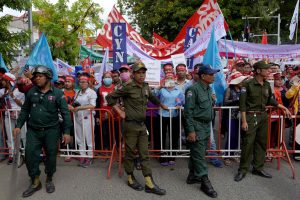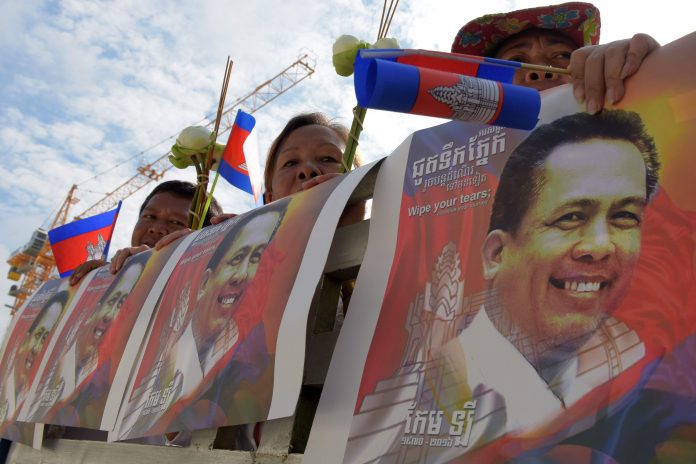(THIS ARTICLE IS MACHINE TRANSLATED by Google from Norwegian)
In both the capital and rural areas, a democratic public deficit in democratic rights has begun to demand influence on both destination and route in Cambodia's long journey from war to peace.
Battambang, Phnom Penh, Kratie Province. «Wipe your tears; continue your journey, ”it says on a poster in one of Battambang's central Buddhist temples. The message appears quietly like the temple cats resting in the noon – and the monks whose walk around the shrines go silently. Battambang is, on the whole, a seemingly quiet place. The provincial city of western Cambodia escaped – relatively – cheaply from both the Vietnam War and the Khmer Rouge. Now it is also a haven for artistic excuses and critical thinking.
The poster, which is hung above the entrance to the monks' homes, is in its own way quite a loud highlight. The message is accompanied by a portrait of Kem Ley (1970 – 2016), a political analyst who was known for his blatant comments on the ruling Cambodian People's Party (CPP) – until he 10. July 2016 was gunned down in a Star Mart store at a Caltex gas station in the capital, Phnom Penh, in the middle of the morning coffee.
In March 2017, a man named Oeut Ang, who fired the weapon against Kem Ley, was sentenced to life in prison. It is a widespread assumption in Cambodia that the liquidation was ordered by people from the inner circle of the ruling party. However, the prosecution has not taken much interest in this possible connection.
Battambang is a haven for artistic excellence and critical thinking.

Activists around the world mark May Day with marches demanding better working conditions, more jobs and higher wages. / AFP PHOTO / TANG CHHIN SOTHY
Rebellious monks. One of Kem Ley's close friends was But Buntenh, founder of The Independent Monk Network for Social Justice. Cambodia's monks have been trying to pacify as a political force since Prime Minister Hun Sen's government consolidated its power by violently suppressing opposition to the 1997 elections. Monk orders played an active role in the protests and the CPP then banned monks from participating in political processes. At the 2002 elections, they were deprived of the right to vote. Now Cambodia's monks have started to move again.
The CPP has been in close contact with the Communist Party of Vietnam in practice uninterruptedly since the Pol Pot regime – which was Hun Sen's old factional enemies in the Red Khmer – fell in 1979. Up to the June 2017 local elections and the national election next year is the CPP's grip on power for the first time in twenty years really threatened. The socially indignant monks are just one of many challenges.
Government and opposition. The main parliamentary challenger, the Cambodia National Rescue Party (CNRP), which is strong in the capital and among exiled Cambodians, has become significantly more visible in rural areas over the past few years as well. Every time the minibus passes a new village, a CPP sign bumbles past. Almost every time, the CPP's sign is followed by the CNRP's. Both have made a virtue out of having local offices in every single spot, and the CNRP is catching up with the CPP despite the ruling party's historic advantage.
This is not a development the government party is taking lightly. In early April, the CPP forced the opposition party to officially stop the use of the unofficial parole "Replace commune chiefs who serve the party with municipal chiefs who serve the people". Interior Minister Sar Kheng made it clear that the government understood the slogan as a call for violent riots and a violation of the rights of local officials. A communication with potentially serious consequences after the CPP in the spring passed a law allowing parties to dissolve on the basis of a number of elastic assessments, such as a party threatening "national unity" or "state security" or making "serious errors" .
"We live in a culture of corruption and violence."
The United Nations Office for Human Rights in Cambodia (OHCHR) has expressed concern over the law, calling for clarification to safeguard against "arbitrariness". The CPP, which at the turn of the year threatened to throw the OHCHR completely out of the country if they did not turn down the criticism, has again asked them to interfere with the "state affairs".
After nearly 40 years of control over the state apparatus, the ruling party has all the legal, political and bureaucratic tools to stoke the opposition, but there is one crucial factor that binds their strategies: An increasing number of Cambodians find their use of power ridiculous. Thus, in connection with the CPP's parolevendetta, the media used every opportunity to repeat the opposition "commune chiefs who serve the party" versus "municipal chiefs who serve the people" and the parole has probably never been as effective as under the government's efforts to eradicate it.

Nguyen Xuan Phuc is on a three-day official visit. / AFP PHOTO / TANG CHHIN SOTHY
May escalate. Among local social activists, there is both hope and concern at the prospect that the CNRP can actually threaten the CPP's government power in the 2017 and 2018 elections. Hope, because a parliamentary break-up can bring political-social change and openings. Concerns because the CPP is not going to give up power voluntarily. Something the government party spokesmen regularly recall in more or less direct terms.
Cambodia is officially a multi-party democracy, but the CPP often argues with some kind of earned historical right to the state. Portraits of the party's leading figures look resolutely against the population of house walls and electric masts throughout the urban landscapes. Even before the turn of the year, the anniversary edition of the CPP's posters at the headquarters in Phnom Penh had been replaced with the figures 1979–2017 – which could make the mere finding of duration secure eternity.
"I fear an armed escalation of the political conflict within the next year," says Mony, a Cambodian NGO leader in his late 30s at an air-conditioned cold cafe in central Phnom Penh. "An armed escalation, but not a civil war. Because there is only one party that has weapons, and that is the government. They are not going to give up the state. It is inconceivable. Their entire economy is tied to access to state apparatus ».
Most of Mony's own family works for the state while he is the mysterious outsider.
"In Cambodia, you don't ask, 'how much do you earn?' You ask, 'how much money are you making?'. No one in the state does not make money on their position and no one gets a position in the state without paying for it. Once you get the position, you must pay your superior to keep it. There is no way around the corruption. I couldn't live with that, "he explains about why he said no to his uncle's offer of a job many Cambodians would give their right arm for – and instead works for a modest NGO salary. Working for the state is one of the few safe income opportunities available in Cambodia.
“They still ask the family parties how much money I make. When I respond with my monthly salary, they just think I won't tell the truth. "
Mony shakes his head and empties the smoothie that has cost more than what the average Cambodian has to live for a day. NGO workers in the capital, even those who are modestly paid, have access to a degree of comfort that is beyond the reach of the majority.
"In this conflict, only one party has weapons, and it's the government."
Timber Smuggling. One of the places in the economy where the bribe is as logical as it is visibly visible is lumber smuggling from Cambodia's unique – and rapidly dwindling – forest areas. Part of the timber is transported on lorries operating in shuttles from, among others, Prey Lang, a vast forest area extending westward from Mekong towards Laos and Thailand.
There are not many roads in Cambodia, and stopping the log smuggling northwest to Thailand and east to Vietnam would be as easy as shooting a political analyst into a Star Mart at 8.30am. XNUMX in the morning. Still, traffic continues. There are many links in the revenue chain: the local villager or migrant worker who fells the tree; the local official and the local foresters who close their eyes; the driver hauling it across the border; the customer in Vietnam or Thailand, and not least the Cambodian military unit or the Cambodian – or foreign – companies that organized the trade.
The timber also disappears out of the country in smaller, and less organized, quantities. A humid, dusty afternoon in one of Kratie Province's small villages on the outskirts of the Prey Lang forest, people are heading home – or beyond – from today's work. A girl comes walking with a herd of cows, and behind her is seen the first motorcycle, which is shrinking at almost as low speed as the cows. The driver has both feet ready to take off on the paved dirt road. On the tailgate are some cut pieces of reddish-dark timber. As he is bummed by, the next motorcycle appears with the same pack. They are on their way to Vietnam. When the Mekong River is crossed, it is approximately 200 kilometers to the border. Along the way, yellow-brown fuel can be poured on empty cola bottles, which are sold from stalls in the ditch.
Controversial deforestation. The management of the country's natural resources is one of the controversies on which the CNRP has challenged the CPP, and the government party has in recent years sought to put a symbolic end to deforestation. However, timber is still disappearing across borders and individual motorcycle freight is the least problem. As the locals say, there is a difference between felling a single tree by hand and coming roaring with machines that can clear hundreds of acres a day. Deforestation was one of the themes that Kem Ley focused on until someone put an end to his journey. The same happened to environmental activist Chut Wutty, who was shot in 2012 when he was on his way to document the military's involvement in illegal logging at the Cardamom Mountains.
"We live in a culture of corruption and violence," Mony says. "It's the one we have to get rid of if anything needs to change".
Sources:
- Phnom Penh Post and Cambodia Daily; «The revitalization of Budd-hist peace activism in post-war Cambodia» by Bunly Soeung and SungYong Lee, in the journal Conflict, Security & Development, April 2017
- Hun Sens Cambodia by Sebastian Strangio, Yale University Press (Silkworm Books edition), 2014
- Cambodia Votes by Michael Sullivan, NIAS University Press, 2016.


